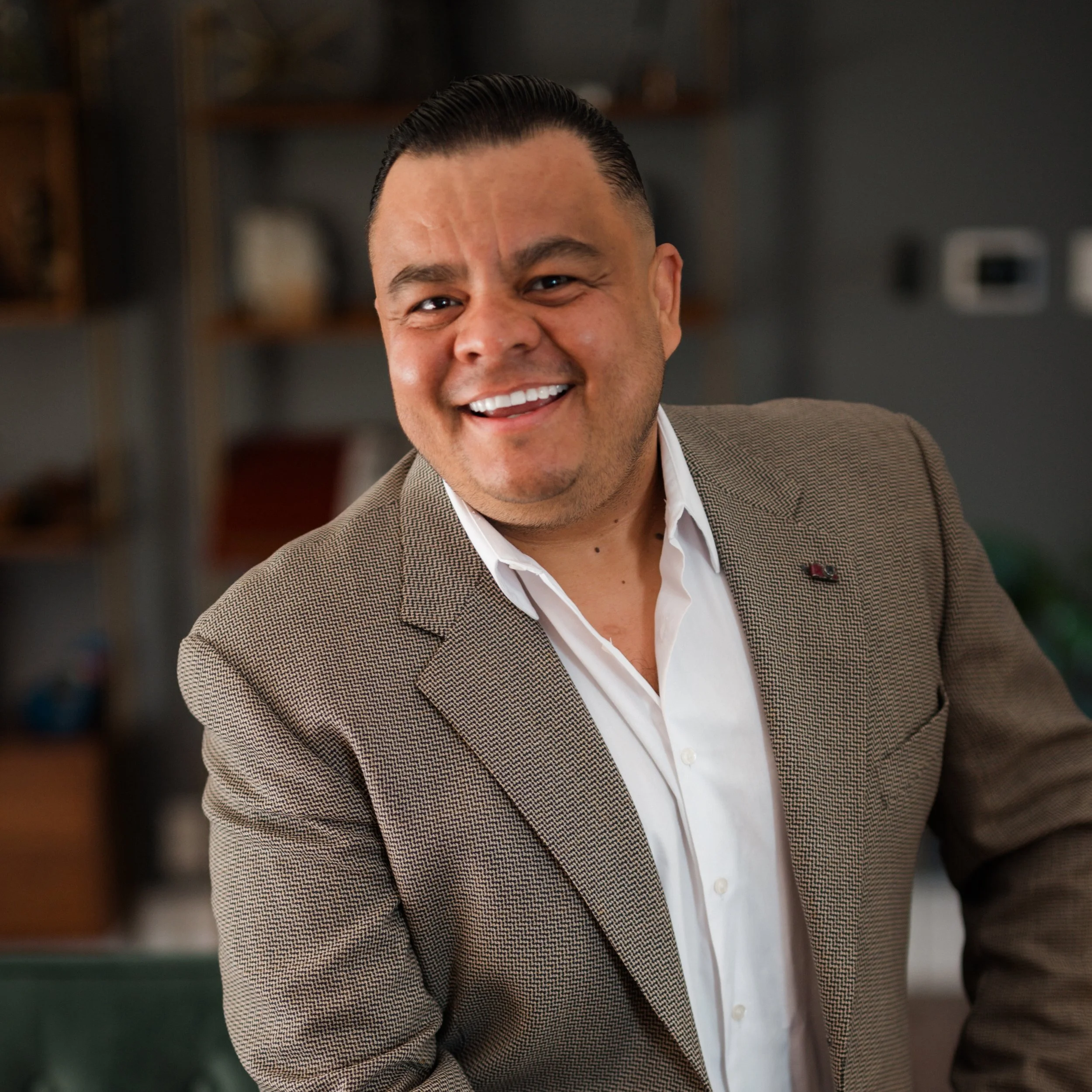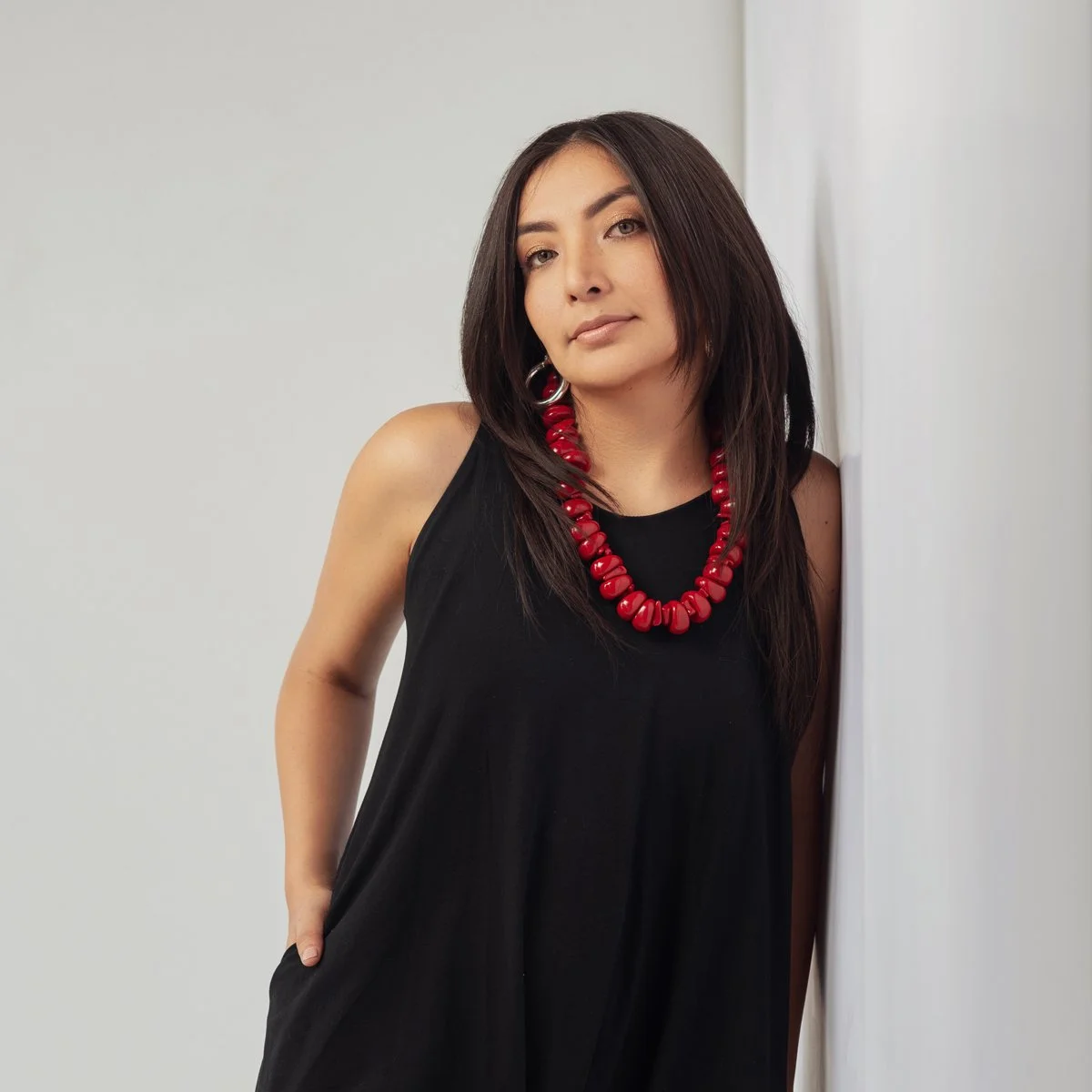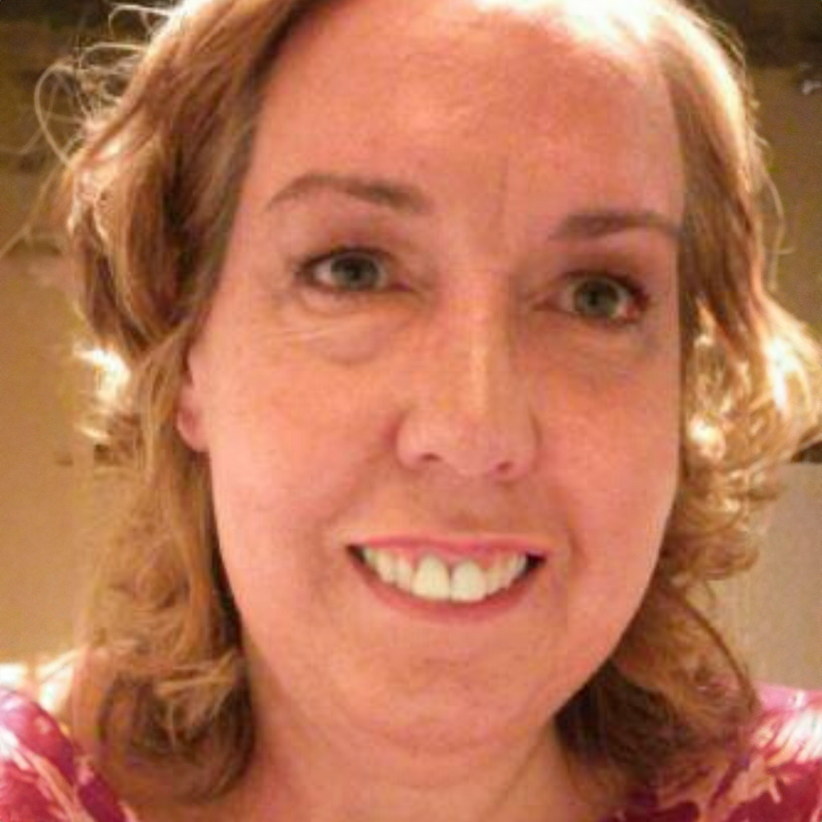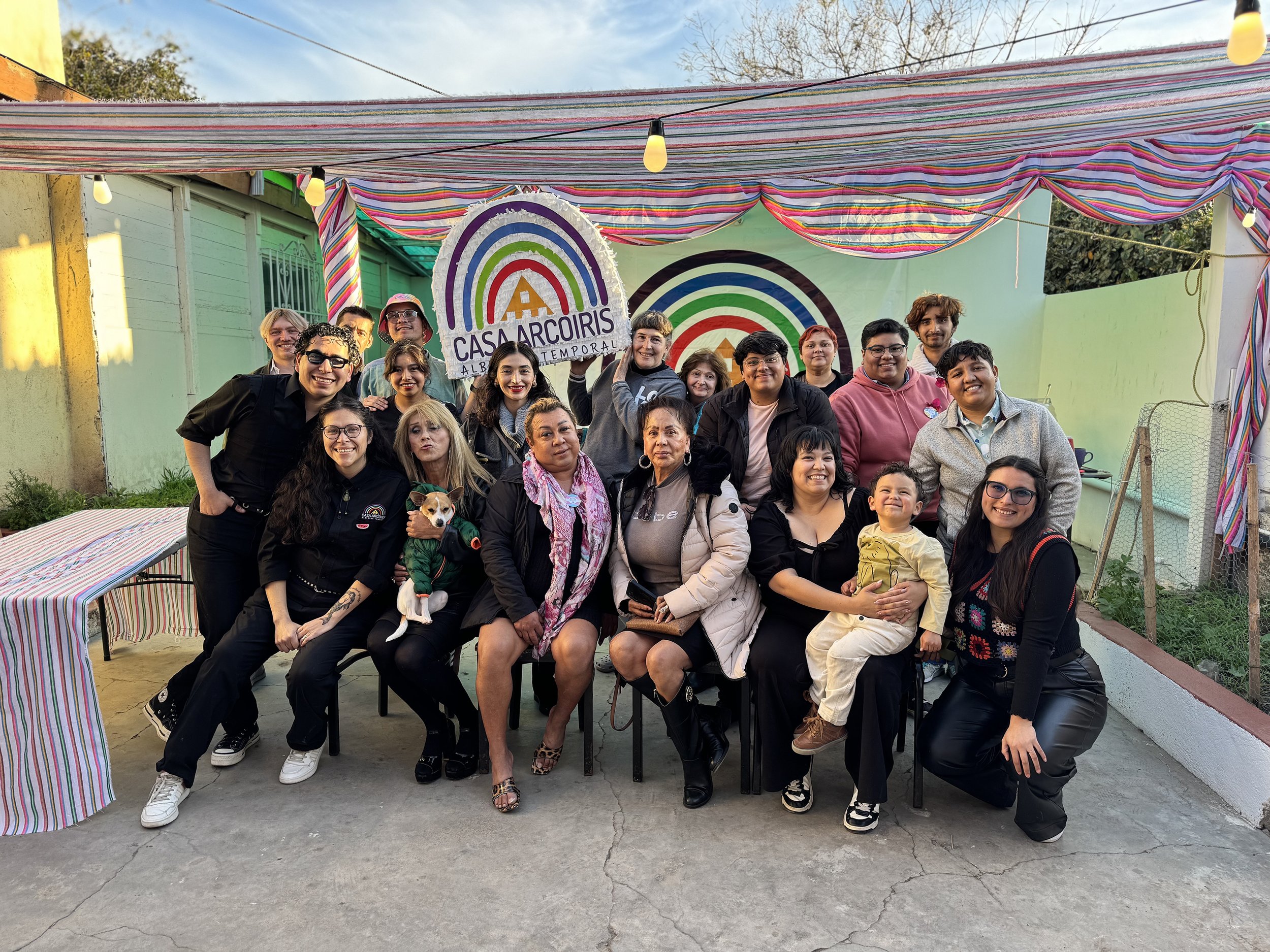Between Rainbows and Resistance: Seeking Light in Times of Fear
Illustration by Pepa Ilustradora for palabra
In a year marked by political attacks, the LGBTQ+ community transforms fear into struggle and uncertainty into hope.
Haga clic aquí para leer este reportaje en español.
Sitting in his home, Eduardo Lara reflects on the past and the future. To his right is a portrait of his husband, Gaudencio Márquez. Eduardo contemplates and is grateful for his peace of mind. His academic degrees adorn the walls, leading up to a tall bookshelf filled with works by Sandra Cisneros, Víctor Villaseñor, Gabriel García Márquez, and other titans of Latin American literature. Although Eduardo is aware of his privilege, uncertainty troubles him.
Eduardo, an activist and resident of Long Beach, California, and also president emeritus of the Long Beach LGBTQ+ Center, reflects on the years when he spent hours or days reading political news and sharing his opinions on social media.
“I don't read as much about politics anymore to protect my mental health, because every day — no, every hour — something new comes out about the civil rights abuses, not just in our LGBTQ+ community but in many communities,” he commented.
Eduardo says he understands the importance of staying informed. Still, to protect his mental health, he has consciously decided to limit the information he consumes during President Donald Trump's second term. He says he has become more selective with the information he consumes because it was affecting his emotional well-being.
"I noticed the changes at the end of the day. I noticed I wasn't in a good mood with all the negative things that were happening."
After noticing his mood swings and how overwhelmed he became by the end of the day, Eduardo decided to prioritize his emotional well-being, because he says, "When an administration psychologically affects the public, what this president is doing is the first step toward control."
Eduardo Lara, left, and his husband, Gaudencio Márquez, at the Long Beach Pride parade in 2019. Photo courtesy of Eduardo Lara
June, historically known as Pride Month, a month of celebration, visibility, and ongoing struggle, is experienced differently this year for many people in the LGBTQ+ community: Instead of joy, there is fear; instead of certainty, uncertainty.
Eduardo did participate in the Long Beach Pride parade this year, walking with a smile through the streets surrounded by rainbows, but deep down, many things worried him. Eduardo is a firm believer that the LGBTQ+ community is under attack by the current Trump administration.
“Yes, we are under attack — from public discourse to legislation,” he commented. “There is a lot of fear, and I think that's an understatement. Concern, fear, anger.”
‘It's really important for people to remember that experiencing joy doesn't mean denying our pain. You can feel joy and still be angry.’
Eduardo pointed to the executive order signed by the president banning transgender people from the military, the elimination of diversity, equity, and inclusion (DEI) programs, and the cuts to HIV funding, measures that Eduardo asserts directly affect a community that has been fighting for its rights for decades. For Eduardo, these policies don't make headlines; they have real and deeply personal implications. He clearly remembers the day his husband, Gaudencio, became seriously ill and had to be hospitalized. Because they have been legally married since 2017, Eduardo was able to be present, make medical decisions, and defend his partner's rights at a critical moment.
The mere thought that this right could be eliminated generates anxiety and deep uncertainty. “There have been some comments, reflected in articles and analyses, that some of the Supreme Court justices might be open to the case coming to court to overturn what I call marriage equality,” he warned.
Eduardo Lara, in red shorts, at the Long Beach Pride parade this year. Photo courtesy of Eduardo Lara
This mix of emotions: fear, uncertainty, and the urge to celebrate, is not unique to Eduardo. Mayme L. Connors, a Texas-based therapist specializing in LGBTQ+ affirmative mental health, has noticed a similar pattern among her patients. This Pride Month, many of them are experiencing mixed emotions, marked by fear in the face of a hostile political climate.
“Anxiety is at an all-time high. That’s what’s showing up most: anxiety, definitely. There’s a lot of depression. Internalized homophobia has worsened,” Mayme shared. “Self-harming behaviors have increased. Avoidance of social situations is very common.”
“It's hard to think about going out to celebrate when you're sad and feeling like many of us do — angry,” she added. “And I think it's really important for people to remember that experiencing joy doesn't mean denying our pain. You can feel joy and still be angry.”
Mayme warns that constant stress not only affects emotional health but also physical health.
“Stress kills, that's something we all know. And it makes it difficult for your central nervous system to calm down when you live under pressure,” Mayme told palabra.
Eduardo Lara, left, with his husband during the Long Beach Pride parade in 2023. Photo courtesy of Eduardo Lara
Living in a state of hypervigilance can disrupt the nervous system and weaken the body.
“I call it a constant bath of cortisol,” she explained. This type of prolonged stress can lower immune defenses, make it difficult to sleep, affect concentration, and dull the ability to feel genuine joy. “It's very difficult to truly laugh or enjoy everyday life when your entire body is on alert,” she added.
Mayme insists that the community must find ways to protect their emotional well-being without falling into total disconnection. She suggests starting with small but meaningful actions, such as setting limits on news consumption and social media use, as Eduardo has been doing.
“Algorithms feed on our outrage. The more we interact with content that angers us, the more of it they show us. We have to be very careful with what we consume,” she said.
‘We mustn't allow fear to paralyze us. We have to continue living, we have to continue existing, we have to reaffirm our existence within this society.’
She also recommends fostering spaces for community and connection. “Sometimes the best we can do is simply share our collective pain.”
The current political climate has not only impacted individuals; it has also challenged community organizations that have been pillars of support for many years.
Bamby Salcedo, president and founder of the TransLatin@ Coalition, has experienced this firsthand. From Los Angeles, where she leads one of the most visible organizations defending the rights of trans Latinas, she has noticed how the setbacks in public policies and hate speech have hindered daily work and weakened available resources.
Bamby Salcedo, president and founder of the TransLatin@ Coalition, at a rally in Los Angeles. Photo by Paolo Riveros/courtesy of TransLatin@ Coalition
Like many members of the LGBTQ+ community, Bamby also defends the idea that her communities are under attack.
Bamby revealed that her organization has received several letters notifying them of the cancellation of key contracts, which will have devastating consequences for the services they provide. “We know that after June 30th, we will lose approximately one million dollars in programs and contracts,” she warned.
Among the initiatives slated to disappear are a program for substance use prevention and mental health, an HIV program, another focused on workforce development funded by the U.S. Department of Labor, a program for violence prevention, and one dedicated to combating hate crimes. In total, five programs will cease to operate, which will directly affect many people who depend on these resources.
Faced with this challenging scenario, the organization has not given up, although unfortunately, Bamby acknowledges that team morale occasionally suffers.
“There are times when morale is a little low, and there are issues of depression,” she confessed, referring to the staff and the people they serve.
The TransLatin@ Coalition provides resources for the LGBTQ+ community in Los Angeles, including substance use prevention, mental health services, HIV programs, workforce development, and violence prevention. Photo courtesy of TransLatin@ Coalition
However, she emphasized that the response has been collective and decisive. “We as an organization have decided that, precisely in these dark times we are experiencing, we want to be a light for all our people.”
“We are trying to bring some joy to everything that is happening, to build resilience, to create our own narratives to counter everything that is being said against us,” she added.
To counter the loss of funding, the organization has decided to take action with creativity and determination.
“What we're doing to counter all of this is organizing a walk called Walk4Humanity,” she shared. The event is scheduled for August 24 and seeks to mobilize the community in a crowdfunding campaign.
“The idea is to ask a thousand people to each help us raise a thousand dollars, and with that we can supplement the million dollars we're going to lose,” she explained. Beyond the economic impact, this action also represents an act of unity, visibility, and resilience.
The TransLatin@ Coalition float at this year's West Hollywood Pride parade. Photo courtesy of TransLatin@ Coalition
Giovanni Rocco, a member of the Capital Pride Alliance board of directors and co-chair of the communications committee, is quick to state that, like many others, he believes the LGBTQ+ community is under attack. However, this context hasn't stopped the organization from promoting a message of hope and unity.
As part of World Pride 2025, which is in Washington, D.C., for the first time, the Capital Pride Alliance kept its traditional programming, including concerts, the Pride March, and a series of cultural events.
This year, under the theme "The Fabric of Freedom," the organization seeks to highlight and celebrate the rich diversity that exists within the LGBTQ+ community.
"Our community is incredibly diverse, and this year we want to celebrate that diversity. And when I say diversity, I mean not only sexual diversity, but also gender, racial, geographic, regional, and religious diversity," Giovanni explained.
The Capital Pride Alliance's Pride parade in Washington, D.C., in 2024. Photo by Mandie Garcia/courtesy of Capital Pride Alliance
This year sees a particularly significant addition: the Human Rights Conference in Washington, D.C., which brought together leaders and activists from around the world from June 4 to June 6.
“In a space together to converse, to discuss the moment we're living in,” Giovanni noted.
Despite the enthusiasm generated by World Pride and the symbolic importance of holding it in the nation's capital, the financial challenges have not gone unnoticed. Giovanni explained that, due to the current political climate, several companies that had historically sponsored the event canceled their donations or simply did not return as sponsors this year.
“But we have an excellent fundraising team, and they've been able to find other resources,” he mentioned optimistically. The situation has tested their resilience and creativity, but it has also highlighted the community's commitment to keeping these spaces of visibility and resistance alive.
Attendees at the Capital Pride Festival in downtown Washington, D.C., organized by the Capital Pride Alliance. Photo by Mark Mahon/courtesy of Capital Pride Alliance
On the border between Mexico and the United States, the fight for dignity and security also has its own name: Casa Arcoíris. Run from Tijuana, Mexico, by a team committed to human rights, this organization serves as a temporary shelter and community center for LGBTQ+ people on the move, including migrants, asylum seekers, and displaced persons.
Apoya las voces de periodistas independientes.
|
Although Casa Arcoíris does not receive direct support from the U.S. government, the political climate north of the border has also reduced its international support network. Arturo Ventura, Casa Arcoíris' operations coordinator, explained that many organizations that previously offered assistance have seen their own resources reduced.
"Some organizations, for example, that helped us with internet or food supplies, it's not that the help has stopped or that they've stopped providing support, but the dynamics have changed a bit. Maybe it's not as frequent or in the same way," Arturo commented.
Another way Casa Arcoíris has been affected is after the executive order indefinitely suspended the right to request asylum at the U.S. southern border. This decision had immediate consequences for the LGBTQ+ migrant community fleeing violence.
Casa Arcoíris community members and allies at their Queermés Primera Edición (Queer Month First Edition) event in March 2025. Photo courtesy of Casa Arcoíris
That process flowed steadily: people arrived requesting refuge, were connected with legal support organizations, and then continued on their way to a possible safer future. But the interruption of the right to asylum changed everything.
This June hasn't been a joyful month for everyone.
But even amid the sadness and anger, there's a persistence in resisting. This year, more than ever, Pride is experienced as an act of rebellion. "I want to be more present in the community. I want to raise my voice more," said Mayme.
"We are a strong community, a community that has shown for years and years, decades and decades, how strong we are," added Giovanni.
"We mustn't allow fear to paralyze us. We have to continue living, we have to continue existing, we have to reaffirm our existence within this society," concluded Bamby.
Pride, this year, is not just a celebration; it's a declaration that the community is still here, still fighting, and still shining.
Bamby Salcedo with the TransLatin@ Coalition float at this year's Long Beach Pride parade. Photo courtesy of TransLatin@ Coalition
—
Andrés H. Martínez is a journalist, writer, and content creator with experience in local newsrooms and national storytelling initiatives. He currently freelances for Palabra and other media organizations, serves as Treasurer for NAHJ Los Angeles, and is a graduate of Cal State Fullerton. @andres_h_mtz
María José Mesías, known as Pepa Ilustradora, is a visual communicator from Ecuador whose work focuses on social change topics such as gender equality, human rights, migration, violence, and more. As a freelance illustrator, she has worked with various media outlets and social organizations, including Radio Ambulante, UN Women, UNICEF, and many others. Her work has been commissioned by magazines, blogs, podcasts, and campaigns. Additionally, she works in literature, including the book "Ana en Todas Partes," published by Fondo de Cultura Económica of Mexico. @pepailustradora
Patricia Guadalupe, raised in Puerto Rico, is a bilingual multimedia journalist based in Washington, D.C., and is the interim managing editor of palabra. She has been covering the capital for both English- and Spanish-language media outlets since the mid-1990s and previously worked as a reporter in New York City. She’s been an editor at Hispanic Link News Service, a reporter at WTOP Radio (CBS Washington affiliate), a contributing reporter for CBS Radio network, and has written for NBC News.com and Latino Magazine, among others. She is a graduate of Michigan State University and has a Master’s degree from the Graduate School of Political Management at George Washington University. She is the former president of the Washington, D.C., chapter of NAHJ and is an adjunct professor at American University in the nation’s capital and the Washington semester program of Florida International University. @PatriciagDC

















